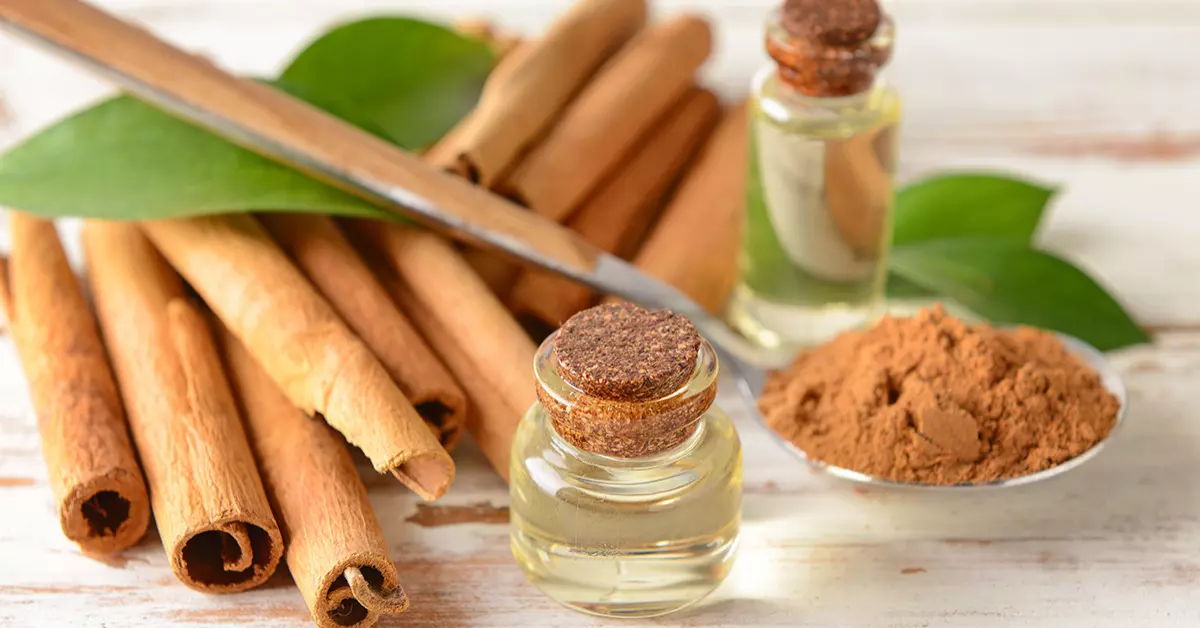Cinnamon is a highly delicious spice. It has been prized for its medicinal properties for thousands of years. Modern science has now confirmed what people have known for ages.
Cinnamon has been used as a medicine in traditional Ayurvedic and Chinese medicine for centuries. Known for its benefits linked to digestion and gastrointestinal complaints, cinnamon has long been used as a home remedy for heartburn, indigestion, and nausea.
The spice comes from the inner bark of a small evergreen tree from the Cinnamomum family. Once upon a time, it was more valuable than gold. This spice has a pleasant flavor and warm smell that has made it popular in cooking, particularly in baking and curries. It is the most popular medicinal spice using since ancient times.
The spice comes from the inner bark of a small evergreen tree from the Cinnamomum family. Once upon a time, it was more valuable than gold.
This spice has a pleasant flavor and warm smell that has made it popular in cooking, particularly in baking and curries. It is the most popular medicinal spice using since ancient times.
Here are some of the amazing cinnamon benefits for health:
It is loaded with antioxidants
Antioxidants protect your body from oxidative damage caused by free radicals. Cinnamon is loaded with powerful antioxidants, such as polyphenols.
In a study that compared the antioxidant activity of 26 spices, cinnamon wound up as the clear winner, even outranking “superfoods” like garlic and oregano.
In fact, it is so powerful that cinnamon can be used as a natural food preservative. Cinnamon contains large amounts of highly potent polyphenol antioxidants.
Antioxidants can reduce oxidative stress that has been proven to damage cells and contribute to nearly every chronic disease such as type 2 diabetes. Cinnamon is rich in antioxidants such as choline, beta carotene, alpha-carotene, etc. Cinnamon is so powerful that it acts as a natural food preservative.
Cinnamon also contains large amounts of polyphenol antioxidants. Antioxidants can help protect the body from disease and are found in fruits, vegetables, herbs, and spices. The antioxidants in cinnamon have been found to have anti-inflammatory effects.
May help in type 2 diabetes
Insulin is an important hormone to control your blood sugar levels and regulate your metabolism. Daily consumption of cinnamon improves insulin sensitivity and helps to regulate blood sugar levels.
It slows down the breakdown of carbohydrates in the digestive tract, which results in a reduced amount of glucose entry into circulation.
It has been suggested that cinnamon can have a moderate effect in improving glycaemic control and supporting the management of type 2 diabetes.
However, conclusions are mixed, and larger randomized controlled trials are needed in well-defined population groups using standardized interventions in order to definitively determine the efficacy of using cinnamon in subjects with diabetes.
However, a small amount used at breakfast or in baking will not do any harm and can be eaten as part of a balanced diet.
Several studies have highlighted these possible benefits, including one 2016 research review that found that cinnamon supplements, in conjunction with standard hypoglycemic medications, had “modest effects” on Fasting Plasma Glucose and HbA1c, though the authors noted that “larger and more rigorous” studies were necessary.
Reduces and lowers blood sugar
Cinnamon is well known for its blood-sugar-lowering properties.
Apart from the beneficial effects on insulin resistance, cinnamon can lower blood sugar by several other mechanisms.
First, cinnamon has been shown to decrease the amount of glucose that enters your bloodstream after a meal.
It does this by interfering with numerous digestive enzymes, which slows the breakdown of carbohydrates in your digestive tract.
Second, a compound in cinnamon can act on cells by mimicking insulin.
This greatly improves glucose uptake by your cells, though it acts much slower than insulin itself.
Numerous human studies have confirmed the anti-diabetic effects of cinnamon, showing that it can lower fasting blood sugar levels by 10–29%.
The effective dose is typically 1–6 grams or around 0.5–2 teaspoons of cinnamon per day.
For more information on how you can lower your blood sugar levels, check out 15 easy ways to lower blood sugar levels naturally.
Cinnamon has been shown to reduce fasting blood sugar levels, having a potent anti-diabetic effect at 1–6 grams or 0.5–2 teaspoons per day.
Some evidence suggests that the consumption of cinnamon is associated with a short-term reduction in blood pressure. It also helps to reduce the cholesterol levels that help to reduce the risk of heart problems.
There is some evidence to suggest that the consumption of cinnamon is associated with a short-term reduction in blood pressure.
Although the evidence is hopeful, it would be premature to recommend cinnamon for blood pressure control until a comprehensive randomised controlled trial (RCT) involving a larger number of patients has been carried out. Thus reducing blood pressure is considered as one of the major cinnamon benefits.
More recent studies have, to date, shown less promising findings.
Help cure indigestion
Cinnamon extract has been used to alleviate gastrointestinal problems in both Eastern and Western medicine for years. It has been described as a carminative, renowned for its digestive, anti-microbial and anti-inflammatory properties.
Some spices, including cinnamon, have prebiotic properties that promote the growth of beneficial bacteria and help suppress the growth of pathogenic bacteria. Therefore, including spices regularly in your diet may help improve gut health.
Cinnamon is also a useful source of manganese and contains small amounts of calcium and fiber.
In traditional Ayurvedic medicine, cinnamon bark oil is used for treating flatulence and digestive imbalance. It is believed that the warmth of cinnamon increases blood flow and improves blood oxygen levels to help fight off illness.
To alleviate digestive symptoms, cinnamon is taken as part of a hot drink (much like a tea). In this instance, it’s easier to use ground cinnamon rather than trying to grate cinnamon sticks yourself.
Help manage metabolic diseases
It’s perhaps no surprise that if cinnamon has possible beneficial effects on type 2 diabetes, it would also be helpful in the management of the metabolic disease.
One 2016 literature review found that cinnamon could be effective in reducing complications, morbidity, and mortality in metabolic syndrome, including reducing blood pressure, plasma glucose, obesity, and dyslipidemia.
However, while these possible results of consuming cinnamon are certainly promising, more well-designed subject trials are necessary before true conclusions can be drawn.
Cinnamon can also be used as an appetite suppressant for those with a sugar addiction, thanks to its naturally sweet taste.
Cinnamon is a spice that is made from the inner bark of trees scientifically known as Cinnamomum.
It has been used as an ingredient throughout history, dating back as far as Ancient Egypt. It used to be rare and valuable and was regarded as a gift fit for kings.
These days, cinnamon is cheap, available in every supermarket, and found as an ingredient in various foods and recipes.
Cinnamon is made by cutting the stems of cinnamon trees. The inner bark is then extracted and the woody parts removed.
When it dries, it forms strips that curl into rolls, called cinnamon sticks. These sticks can be ground to form cinnamon powder.
The distinct smell and flavor of cinnamon are due to the oily part, which is very high in the compound cinnamaldehyde.
Scientists believe that this compound is responsible for most of cinnamon’s powerful effects on health and metabolism.
Cinnamon is a popular spice. It’s high in cinnamaldehyde, which is thought to be responsible for most of cinnamon benefits for health.

Cut the risk of heart diseases
Cinnamon has been linked to a reduced risk of heart disease, the world’s most common cause of premature death.
In people with type 2 diabetes, 1 gram or about half a teaspoon of cinnamon per day has been shown to have beneficial effects on blood markers.
It reduces levels of total cholesterol, “bad” LDL cholesterol, and triglycerides, while “good” HDL cholesterol remains stable (10Trusted Source).
More recently, a big review study concluded that a cinnamon dose of just 120 mg per day can have these effects. In this study, cinnamon also increased “good” HDL cholesterol levels (11Trusted Source).
In animal studies, cinnamon has been shown to reduce blood pressure (3Trusted Source).
When combined, all these factors may drastically cut your risk of heart disease.
Cinnamon may improve some key risk factors for heart disease, including cholesterol, triglycerides, and blood pressure.
Lower your bad cholesterol
Even if you do not suffer from diabetes or metabolic syndrome, you may want to include cinnamon in your diet for many of the same reasons as those who do.
As Parikh explains, the positive impact on Type 2 diabetes symptoms is due to a number of factors, notably “improving serum glucose, lowering fasting blood glucose, and reducing triglycerides, LDL cholesterol, and total cholesterol.”
These are all benefits that can help even those not suffering from diabetes, including those with hereditary cholesterol worries or problems.
“(Cinnamon) also raises HDL (the “good”) cholesterol,” she explains. HDL cholesterol helps remove LDL cholesterol from the body.
And that’s not all. “Regular intake of cinnamon may also help to mitigate the effects of high-fat meals by slowing the increase in blood sugar post-meal,” says Parikh.
This means that when cinnamon is added to your diet, the effects of occasional high-fat choices may not be quite as detrimental to your health as they would otherwise be.
But while one 2013 research review found a promising link between cinnamon and lowered cholesterol, studies thus far have been small and show conflicting results. More research is necessary to prove these benefits conclusively.
Cinnamon contains a compound called cinnamate that may decrease enzyme activity that makes cholesterol, thus reducing the number of fatty acids in the blood. It helps to reduce bad cholesterol in your body that reduces the risk of heart diseases.
It has antimicrobial properties
Cinnamon has been proven to fight fungal, bacterial, and viral elements in foods: It’s no surprise that in the Middle Ages, when food spoilage was far more frequent due to lack of refrigeration, many recipes, both sweet and savory, were flavored with the spice.
But these properties of cinnamon do not extend merely to the foods cinnamon seasons. Consumers of cinnamon can benefit from these properties as well, according to our experts, who say cinnamon can be used as part of a treatment for anything from lung problems to the common cold.
Denise Baron, a wellness educator and director of Ayurveda for Modern Living explains that cinnamon can help with all sorts of lung congestion issues.
It helps clear up mucus and encourages circulation,” she explains, thus lending its powers to everything from a simple seasonal cough to bronchitis, when used in tandem with other remedies.
These cinnamon benefits were highlighted in a research review, which pointed to evidence that cinnamon can inhibit bacteria by damaging cell membranes and altering their lipid profile, among other means.
But while preliminary results are promising, more well-designed trials are necessary before conclusive benefits can be proven.
It could treat Alzheimer’s and Parkinson’s disease
Neurodegenerative diseases are characterized by progressive loss of the structure or function of brain cells.
Alzheimer’s and Parkinson’s disease are two of the most common types.
Two compounds found in cinnamon appear to inhibit the buildup of a protein called tau in the brain, which is one of the hallmarks of Alzheimer’s disease.
In a study in mice with Parkinson’s disease, cinnamon helped protect neurons, normalized neurotransmitter levels, and improved motor function.
These effects need to be studied further in humans.
Cinnamon has been shown to lead to various improvements for Alzheimer’s and Parkinson’s disease in animal studies. However, human research is lacking.
Alzheimer’s and Parkinson’s diseases are two neurological conditions that, for the moment, are incurable. An enormous part of treating these diseases is therefore in symptom management, and this can be boosted with the addition of cinnamon to a regular regime.
“Cinnamon has been shown to help neurons and improve motor function in those suffering from Alzheimer’s or Parkinson’s,” explains Farley. These contributions can help sufferers of these two diseases continue their regular routines with far less impediment.
A 2018 study in Pharmacological Research called these benefits “promising,” noting cinnamon’s ability to inhibit tau protein aggregation and amyloid-β peptides, both trademarks of Alzheimer’s disease. Thus it is one of the greatest cinnamon benefits.
The researchers did, however, note that further molecular and translational research studies, not to mention clinical trials, would be necessary in order to prove these benefits conclusively.
Final Words
With the countless health benefits of cinnamon, we can safely say that it is one of the best home remedies to treat numerous diseases. However, you should not only rely on cinnamon to treat some of the ailments. Visit your doctor if needed.









